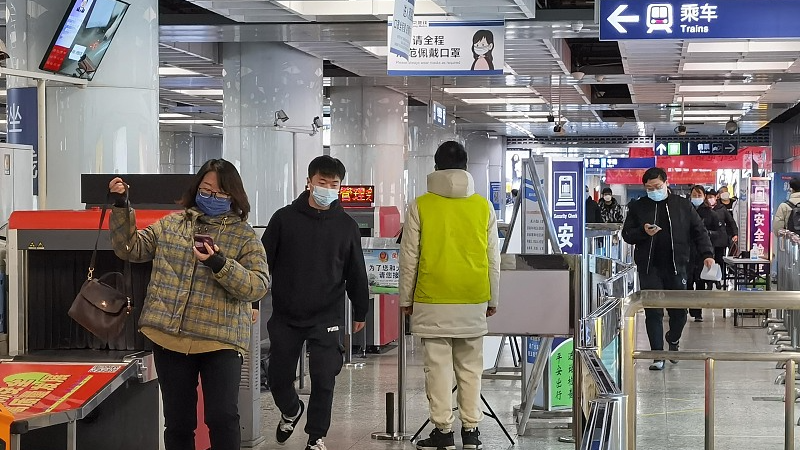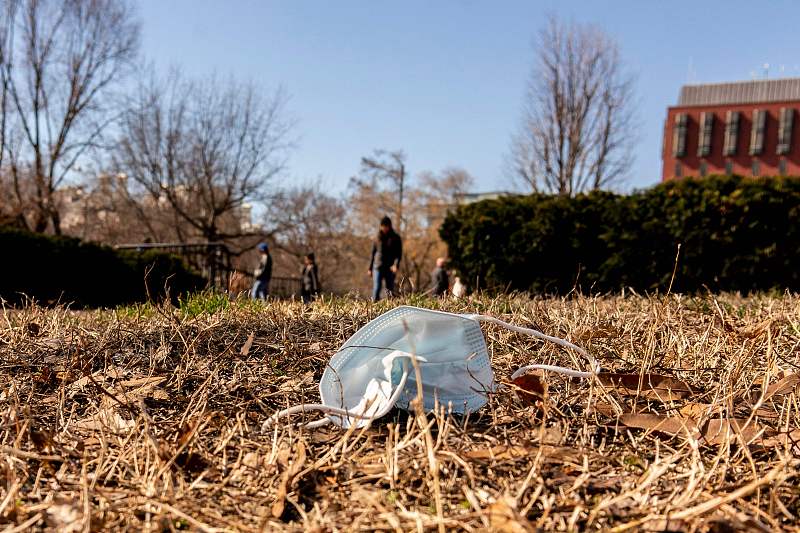
People wearing masks take metro in Nanjing, Jiangsu Province, China, December 5, 2022. /VCG
People wearing masks take metro in Nanjing, Jiangsu Province, China, December 5, 2022. /VCG
Editor's note: Bradley Blankenship is a Prague-based American journalist, political analyst and freelance reporter. The article reflects the author's opinions and not necessarily the views of CGTN.
Much has been made of China's recent COVID-19 caseload in the Western media, from multiple angles that are negative. The Guardian published an opinion piece on November 30 arguing that Beijing's strict dynamic zero-COVID policy can't continue. Four days later, the newspaper published another piece criticizing the country's shift from the policy, arguing that China is not prepared and could endanger the public by reversing course.
The instances highlight the "damned if you do, damned if you don't" approach over how the Western media criticizes American geopolitical adversaries. In regard to China's COVID-19 situation, it shows why Beijing should not take the Western public discourse seriously and why Chinese officials should make decisions that are aligned with the needs of the Chinese without regard to how Western observers might respond.
Compared to Western countries, China's COVID-19 response has been successful. Even if the situation might not be ideal, it is still better than the United States, which has the highest caseload and death toll of any country. Beijing has made difficult decisions to protect public health – even if the situation may change in line with shifting public opinion. This change highlights that China is a democratic country conforming to the will of the public and is not, as the Western media argues, using the pandemic to install a technology-driven autocratic regime.
If Western journalists were doing their job properly, e.g., using their platforms to reveal corruption and improve the quality of public discourse, then they should point their attention inward. The United States has failed to contain COVID-19 on account of corruption and corporate influence.
One of the primary reasons for the spread in the country is that workplaces are one of the primary transmission factors. Unlike most other comparable countries in the Organization of Economic Cooperation and Development (OECD), the U.S. has weak worker protections.
For instance, air quality concerns are a major issue. It has long been acknowledged that COVID-19 is airborne. Mitigating the spread of the virus would involve airborne protocols, such as face masks and ensuring proper air quality. U.S. employers have lobbied the government to ensure that these protections are not mandated at the federal level. The country's national mask mandate was struck down in a federal court after a lawsuit was filed by corporations. They don't want to pay for adequate personal protective equipment for their workers.

A protective mask lies on the ground at Lafayette Square near the White House in Washington, D.C., February 19, 2022. /CFP
A protective mask lies on the ground at Lafayette Square near the White House in Washington, D.C., February 19, 2022. /CFP
Another key issue is the air quality standards implemented by the United States' Occupational Safety and Health Administration (OSHA), which has set Permissible Exposure Limit (PEL) for carbon dioxide of 5,000 parts per million (ppm) (0.5 percent carbon dioxide in air) averaged over an eight-hour work day. (For context, air quality with carbon dioxide of 750ppm or is less considered ideal for indoor spaces). Employers lobbied the federal government against tightening OSHA standards, which has kneecapped federal authorities to contain the virus. That's because it would have cost corporations to install air filters or retrofit workplaces for better quality.
One major issue is the ongoing railway workers dispute, since the United States does not have universal paid sick leave. This issue became salient, since workers were left without a paid sick leave deal thanks to rail companies and the federal government. But, rail workers deserve a week of paid sick leave, since the U.S. needs to have universal paid sick leave for all workers.
Additionally, the U.S. Centers for Disease Control and Prevention (CDC) last year shorted its quarantine recommendations to only five days, even though it is believed that people can still test positive and spread COVID-19 for several weeks. Officially, there are no universal paid sick leave policies and not shortening quarantine could collapse certain industries, such as the airlines, during caseload peaks. The CDC's policy conforms to an unfortunate reality – but, as reported at the time the reason behind this change was that employers from the airline industry lobbied the agency.
However Chinese officials choose to manage the epidemic situation to avoid the well-documented corruption and lack of public safety that has categorized how the United States managed the COVID-19 outbreak. Western journalists are doing a disservice by criticizing Beijing from every conceivable angle while ignoring how their own governments have failed to protect their people in favor of benefitting corporations.
(If you want to contribute and have specific expertise, please contact us at opinions@cgtn.com. Follow @thouse_opinions on Twitter to discover the latest commentaries in the CGTN Opinion Section.)